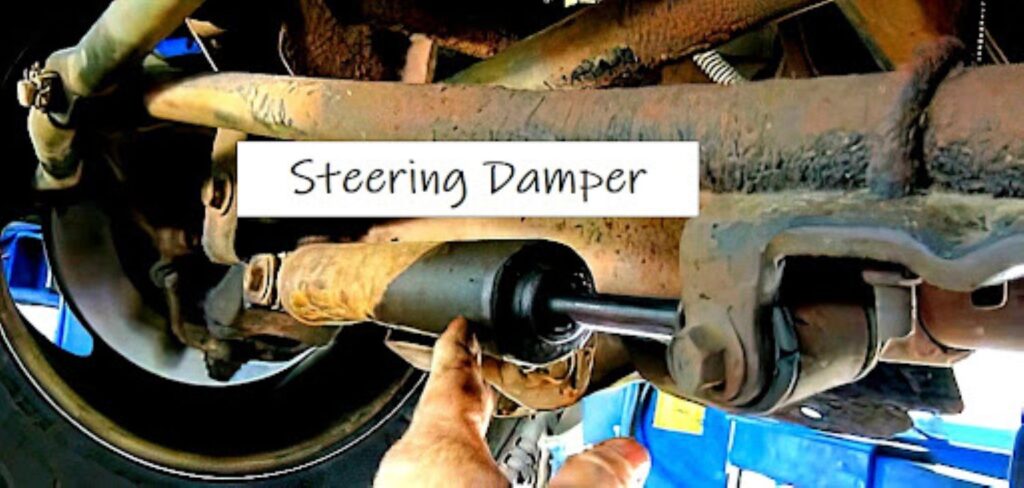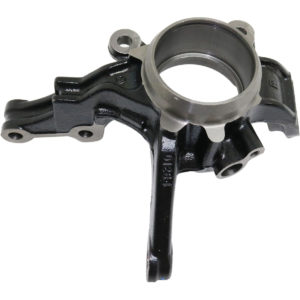If you ever find your steering wheel shaking while driving, it could mean there are internal issues that need addressing. Driving with one can be dangerous to you and those around you, so it’s best to look for the root cause and nip it in the bud.
Causes of Shaky Steering Wheels
Several factors cause shaky steering wheels (also called “wheel shimmy” by some mechanics). Some common ones are imbalanced tires, damaged suspension components, and misaligned wheels.
Here are the common causes of steering wheel shudder:
Imbalanced Tires
Having dynamic balance within your tires means the centerline of its weight mass is in the same plane as the centerline of the wheel. Incorrect dynamic balance can cause your steering wheel to shake, which you’ll usually feel at around 60 mph. This can be caused by mud caked inside the tire. Look for that if you notice it the morning after you drive through deep mud because the mud will dry and remain in the wheel.
Damaged or Worn Suspension Components
Damage to the suspension often causes a shaky steering wheel, affecting the vehicle’s control and stability.

Other common issues include loose shock mounts, damaged or detached springs, and leaking shocks or struts.
Shocks that have lost their damping ability coupled with tires out of balance can cause a bad shimmy. Improperly machined brake rotors can also cause shimmy.
Worn out tie rod ends and drag links can also contribute to shimmy, but the amount of shimmy in those circumstances greatly depends on the tires. Big, fat truck tires are more likely to wear out those components and begin to shimmy than the original tires.
Misaligned Wheels or Bad Tires
Misaligned wheels may cause your vehicle to shake, traveling up to the steering column and your steering wheel. Improper caster angles can cause wheel shimmy. Out-of-round tires can cause steering wheel shake that will vary with speed.
Bad Bearings
Poor lubrication or bad bearings can cause the bearings to wear out, allowing the kind of spurious movement of the wheel on the spindle, which can cause steering wheel shake. The shaking usually occurs when you turn the wheel.
Most bearings on today’s cars are sealed. They can’t be lubricated and must be replaced, which is sometimes a job for a professional mechanic. Other times, it may be quite simple for a wrench-smart DIYer.
Defective Ball Joints
Defective ball joints cause looseness in the suspension, which results in vibration in the steering wheel. Not only that, but your vehicle may also veer sideways, and your steering wheel may exhibit excessive play. Hence, it’s important to have it inspected during car maintenance.
Deteriorating Flexible Coupling
A flexible coupling is a device made from rubber that absorbs vibration and prevents your steering wheel from shaking, allowing you to maintain steering control. Over time, this component may deteriorate due to wear and tear.
Damaged Brake Hose
If you’re experiencing a shaky steering wheel at low speed or when braking, there’s a chance one of your brake hoses is damaged.
Again, brake rotor issues can cause wheel shimmy or a shaky steering wheel in some cases. If you have brake hose problems, they could show up as a wheel shimmy (but they usually won’t). Note that not all brake hose problems are leak-related. Sometimes brake hoses will begin to deteriorate internally and impede fluid pressure from reaching the caliper.
Note that not all brake hose problems are leak-related. Sometimes brake hoses will begin to deteriorate internally and impede fluid pressure from reaching the caliper.
–Richard McCuistian, ASE Certified Master Automobile Technician

Cracked Engine Mount
The engine mount holds your engine in place, so any damage to it may cause your vehicle and steering wheel to shake.
Effects of Shaky Steering Wheels
Steering wheel shudder can lead to the following negative effects for your vehicle:
Limited Control
A misaligned wheel is a common cause of shaking steering wheels, which results in limited control over the vehicle. You might even veer sideways even though your steering wheel is straight.
Potential Safety Hazard
The lack of control over the vehicle could be a safety hazard to you and everyone around you, especially if you have misaligned wheels. While uncommon, some cases of shaky wheels even result in hard swerves.
Driving Discomfort
Since you’ll commonly feel the vibration at 60 mph, when braking, or when turning, you’ll have to be wary of your driving speed. Driving slowly results in longer travel times, which adds up and builds fatigue.
How to Prevent Shaky Steering Wheels
Preventing a shaky steering wheel ensures your safety when you’re out on the road. It’ll help minimize the risks of danger, as well as prolong the lifespan of your vehicle. While it may seem bothersome, the precautionary steps you can follow are simple and easy to do!
Wheel Balancing
Imbalanced wheels may cause vibrations, so the simple solution is to get them balanced. Wheel balancing refers to the process of distributing weight evenly on all your tires, eliminating the shaking on your steering wheel.
Wheel Alignment

The process of wheel alignment involves straightening all four wheels so they face one direction, removing the possibility of veering off sideways which induces vibrations.
Check Your Power Steering Fluid
Having little-to-no steering fluid will also cause your steering wheel to vibrate, so having it replenished should make for a smoother ride.
Brake Maintenance
You’ll need to replace your damaged brake hoses to ensure smooth steering. Remember that they should be strong and flexible enough to handle high-pressure breaks.
Safe Driving Practices
A misaligned wheel is one of the common causes of shaky steering wheels, and it’s often caused by hitting curbs and potholes. Safe driving practices help prevent wheel misalignment which should lead to smoother rides.
Is It Safe to Drive With a Shaky Steering Wheel?
You can still drive with a shaky steering wheel. However, it can be dangerous and not recommended, especially if the cause is severe. Since the issues are usually found within your brake system, engine, or tires, you’ll likely have less control over your vehicle at higher speeds.
A shaky steering wheel poses a hazard to you, other vehicles, and pedestrians on the road. It’s important to have your car checked periodically to prevent further damage and consult a mechanic at the first sign of trouble.
Any information provided on this Website is for informational purposes only and is not intended to replace consultation with a professional mechanic. The accuracy and timeliness of the information may change from the time of publication.

















